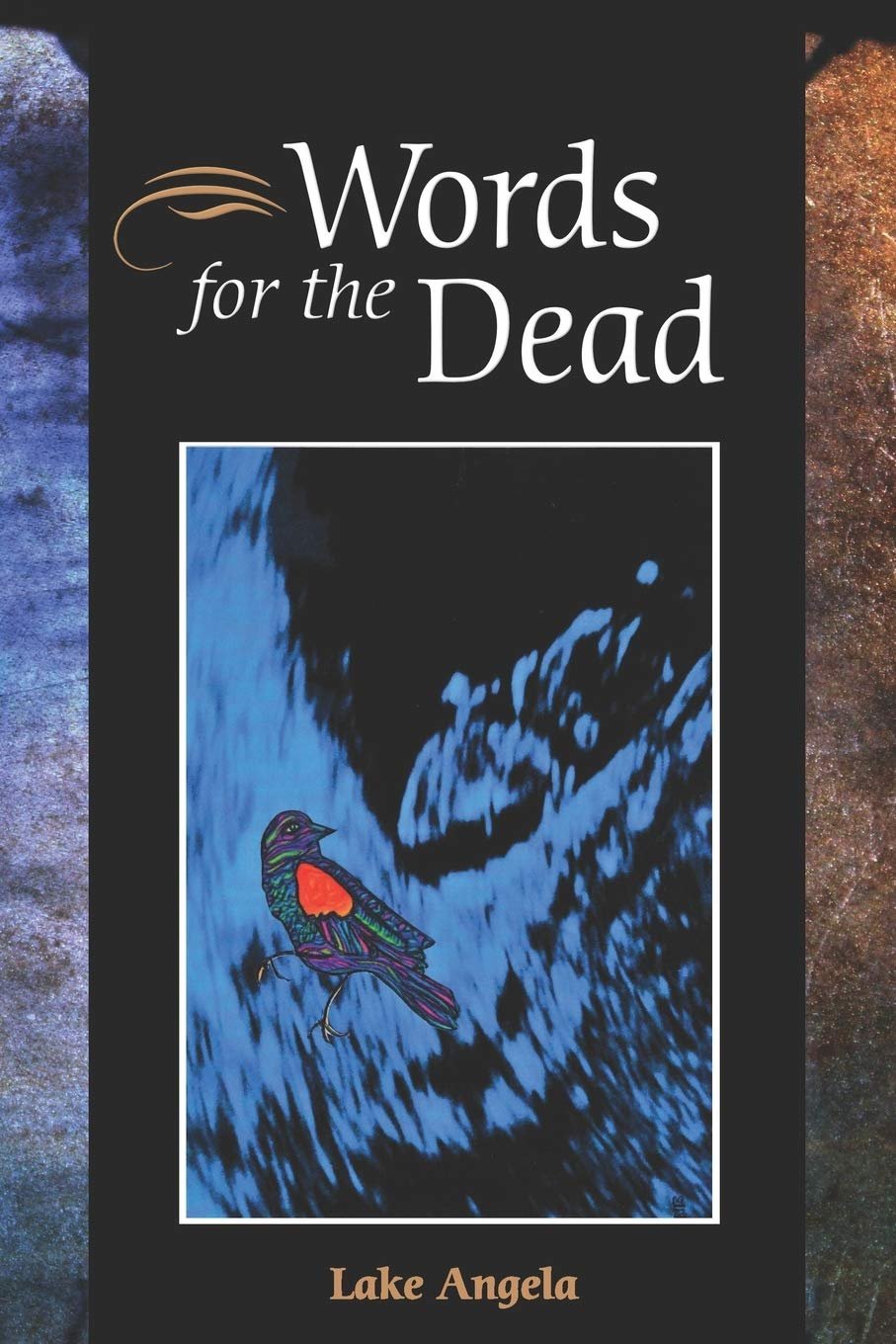Words for the Dead
Words for the Dead by Lake Angela, FutureCyclePress, $15.99
Lake Angela’s poetry collection, Words for the Dead, reminds me of the extraordinary sensory condition called synesthesia. “Some synesthetes,” according to the American Psychological Association, “taste shapes” or “perceive written digits, letters and words in color.” Angela sees pain in color, “composites of color” as she explains it and, in particular, the pain of losing a child which, I believe, to be the crux of this profound collection.
We have all experienced death on a communal level. We have, all of us, lost a parent, a friend, a sibling, or a grandparent. The death of a loved one is one of the most difficult experiences we face as human beings and, arguably, the loss of a child is the most heartbreaking and devastating experience for any parent. This is especially true, I think, for a mother.
On March 20, 2020, roughly at the peak of the COVID-19 pandemic, my wife and I lost our first child. Our child’s death was triggered by an ectopic pregnancy, a condition when the fertilized egg implants outside the uterus. The following year, May 24, 2021, we lost our second child the same way.
Naturally, both experiences were a huge blow to us, but my wife was especially devastated. It did not help matters that we had to shelter in place as a deadly virus spread across Richmond, Virginia. I am not an emotional person, nor am I easily distressed by a crisis. I suppose as a former Benedictine Monk living isolated from the world for several years prepared me for this moment. But my wife was not coping well.
To help ease her mind, we played a lot of board games, prayed and, like everyone else, watched Tiger King. I sometimes surprised her with dinner or a small gift, little things to help her overcome, as much as conceivably possible, our familial tragedy. However, no matter what I did to comfort her, I still could not grasp the psychological pain my wife was facing.
Reading Words for the Dead has helped me put my wife’s feelings in perspective. Angela writes: “A woman must suffer as she drinks/must wail as she cuts/must suffer as she prays/must scream as she gives life.” But the life she was expected to give unexpectedly dies. She continues: “My father bought me this coffin,/but now I will give it to you/if you wish.” I can only imagine how hard it must be for a mother to bury a child. Angela explains: “Our sorrow is there: inside the slender shoot of a flower;/a blooming voice is a blooming arrow,/a terrified sleep.”
It has been almost two years since the death of our first child. My wife is a strong woman and has done remarkably well on a physical level. However, I am sometimes awakened at night from her crying, a “terrified sleep” as I have now come to understand it, through Angela’s vivid words. I often wonder what causes such an explosion of emotion. A traumatic memory, I am sure, is the cause. Angela confirms: “Your desert is burning/while you are lying/prostrate as in prayer,/your chalice slanted/beside you,/the sacred blood spilling down/your legs.”
But emotions can be triggered at any time, night or day, without warning. A baby commercial might trigger a tear, or my wife and I sometimes pass a clothes rack full of onesies that compels her lips to quiver or droop. These day terrors of emotion often leave me unprepared. All I can do is wipe the tear away, kiss my wife on the cheek, and put my arm around her. I know this is the correct move on my part when she snuggles against me. She does not want me to say anything; she just wants me to let her know I love and support her. “This is a love poem, black water,” as if Angela is telling me that unconditional love is the only way to cope with unexpected grief.
Out of all the colors that Angela explores in this book, yellow and blue are the most striking. When researching yellow as a medical term, I was introduced to words like infection, toxic, disease, and contagion. It seems as though the color yellow is constant in Angela’s life, a tough reminder of what she has suffered as a mother. She writes: “The yellow room never leaves me;/centuries old shall press plague-black/lips to our mouth, kissing us/with the conjunction of three planets./The bacteria inside the swells outlive us.” And although she sees yellow clearly, everyday it seems, it is still “a language you do not yet understand.” It is a “house of great sorrow.”
She seems to be angry with God’s silence, as if asking God why He, “the God of man/that God that claims to know me,” allows such a tragedy to happen. We all have questions like this. However, answers are not readily forthcoming. Blue, on the other hand, has been with Angela longer. She is not new to tragedy: “When I was a child, I lived/in the cold,” implies that she has experienced loss before, a sibling perhaps, or a close relative: “the frozen ridge/of dirt, the frost, the bones gleaming from corpse/toys, the blue lips/breaks forth and freezes.” And again: “my snow in blue light, the darkest memory/of my cold as it rises from all memories,/from childhood.”
We, like all people before us, will experience death on a personal level one day. As a former monk I know this all too well. In his Rule, Saint Benedict instructs the monks to “keep death daily before your eyes.” This is the reality of which Angela also reminds us: “It is the thought/of being dead that frightens us.” It seems, at first, to be a perverse reaction to death. Rest assured, however, it is not. In fact, it is in death, ultimately, where hope can truly be found, like “A blanket of snow” that will “keep you/safe: intact.” Ultimately, heaven awaits.
I thank Angela for writing this book. It has not only helped me better understand the emotional pain a mother experiences after losing a child, but it has reinforced my belief that, in death, my wife and I will, one day, be reunited with our children. I no longer look at death as a time of despair; I look at it as a life reborn. And when death approaches, I long to see in vivid color the world around me as Angela sees it, a synesthete, if you will, “In such temperatures and such trials of ice/and strength,” where “only the dead have the chance to escape.”
Matthew A. Hamilton holds an MFA from Fairfield University and a MSLIS from St. John’s University. Currently, he is a graduate student at the University of Alabama. His research focus is blockchain technology and how it can contribute to improve transparency and accountability in government. His stories and poems have appeared in a variety of national and international journals. His chapbook, The Land of the Four Rivers, published by Cervena Barva Press, won the 2013 Best Poetry Book from Peace Corps Writers. His second poetry collection, Lips Open and Divine, was published in 2016 by Winter Goose. The Wishing Tree, a novel about the 1915 Armenian Genocide, was published by Winter Goose in 2020. He and his wife live in Richmond, Virginia. Visit him here.


